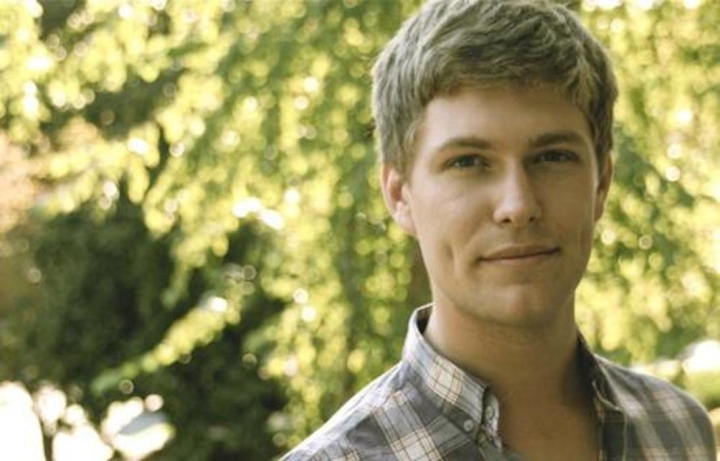
Poet to Watch: Richie Hofmann
On today’s Poet to Watch, Richie Hofmann is up to show us how the lyrical mode in poetry is done.
Many critics have called his work “elegant“, which is pretty precise considering how he combines high-art themes of love and architecture, empire and ruin, in order to create these small nuggets of music that are less tapas bar and more 5-course meal. Winner of prestigious sward including the Ruth Lilly Poetry Fellowship and the Beatrice Hawley Award for his book Second Empire (Alice James Books Nov 2015) his major prizes and publications were rewarded for such taut and intense work, such as his poem “Idyll”, which appeared in The New Yorker:
“Cicadas bury themselves in small mouths
of the tree’s hollow, lie against the bark tongues like amulets,
though it is I who pray I might shake off this skin and be raised
from the ground again. I have nothing
to confess. I don’t yet know that I possess
a body built for love.[…]”
During these times of war and fear mongering, how ruin is acknowledged by the speaker of this poem as a vehicle to “be raised/ from the ground again” is inspiring.
In Richie’s own words:
“The responsibility of the poet is to gather and experience pain and loneliness and joy and sexual love…and to cultivate and to arrange those experiences into something beautiful, something worth paying attention to. I think poetry should create a space where close attention, deep attention, obsessive attention is valued and rewarded. I guess that’s a responsibility of art, in general. Poetry has a harder time, as others have said, because our medium is the medium of most forms of communication. We must reconcile the everydayness and urgency and ubiquity of our medium with the space of deeper attention our poems create.”
Any advice for young writers?
“I always tell my students, there are no rules in writing, only conventions which they must be guided by or artfully/studiously not be guided by. And also, less is more. And also, more is more.”
What I’ve learned from Richie Hofmann’s work is that, indeed, less is more. What he does with just a few lines I typically do in three times as many. I admire how he knows how far to take it while still leaving his readers wanting more. In life, it’s all about the balance of working hard and playing hard and these poems know how to exemplify both while making it look easy.
I’ll leave you with this poem from the Poetry Foundation called “Keys to the City”:
Who are other great poets we should feature on our website, and what do you think about Richie Hofmann’s work? Comment below.
Resources:
For more about Richie Hofmann, please visit http://www.richiehofmann.com.
~Phillip
Glappitnova unites influencers and talent from different industries through storytelling, performances, classes, and events for one crazy 8 day experience in Chicago.The opinions expressed here by Glappitnova.com contributors are their own, not those of Glappitnova.com.
comments
 AI Will Impact 400 Million Jobs by 2030 So Let’s Prepare
AI Will Impact 400 Million Jobs by 2030 So Let’s Prepare
 From Redmoon to Newmoon Theater Announcing Alex Balestrieri on The Global Committee
From Redmoon to Newmoon Theater Announcing Alex Balestrieri on The Global Committee
 Announcing Wingsuiter and Curator Kody Madro on The Global Committee
Announcing Wingsuiter and Curator Kody Madro on The Global Committee
 Glappitnova 2.0
Glappitnova 2.0
 Announcing Creative and Engineer Josh Onwordi On The Global Committee
Announcing Creative and Engineer Josh Onwordi On The Global Committee
 Announcing Global Healthcare Executive Samantha Thaver on the Glappitnova Global Committee
Announcing Global Healthcare Executive Samantha Thaver on the Glappitnova Global Committee
 Announcing Illini Track Star Turned Entrepreneur Jonathan Wells On The Global Committee
Announcing Illini Track Star Turned Entrepreneur Jonathan Wells On The Global Committee
 Announcing Ella McCann On The Glappitnova Global Committee
Announcing Ella McCann On The Glappitnova Global Committee
 Announcing Cultural Executive Andrew Harris On The Global Committee
Announcing Cultural Executive Andrew Harris On The Global Committee
 Announcing Matt Carney Of Root Tulsa On The Glappitnova Committee
Announcing Matt Carney Of Root Tulsa On The Glappitnova Committee
 Announcing Jerica D. Wortham Tulsa On The Global Committee
Announcing Jerica D. Wortham Tulsa On The Global Committee
 Announcing Michael Grogan Tulsa On The Glappitnova Global Committee
Announcing Michael Grogan Tulsa On The Glappitnova Global Committee
 Community Development Tips For Millennial Audiences, Wanna Come?
Community Development Tips For Millennial Audiences, Wanna Come?
 The Advertising Industry Is Working Scared
The Advertising Industry Is Working Scared
 Announcing Our New Platform, Foonova
Announcing Our New Platform, Foonova
